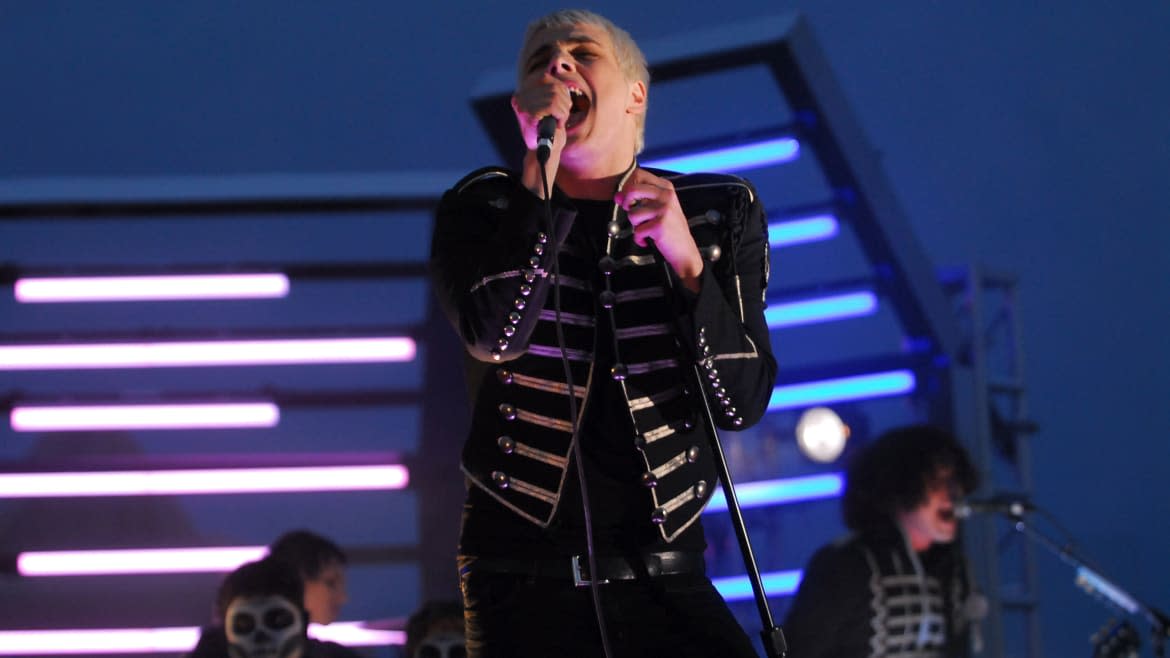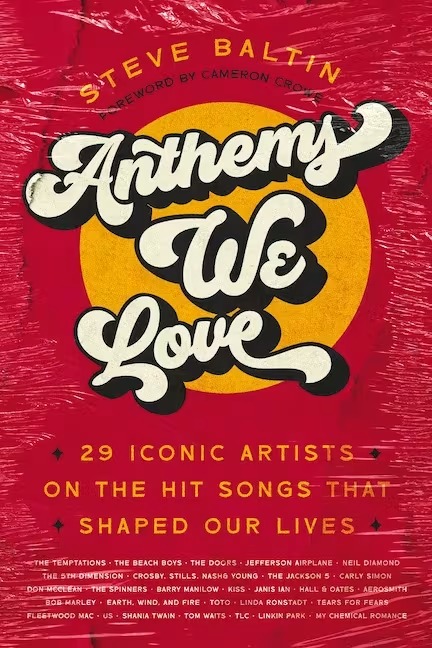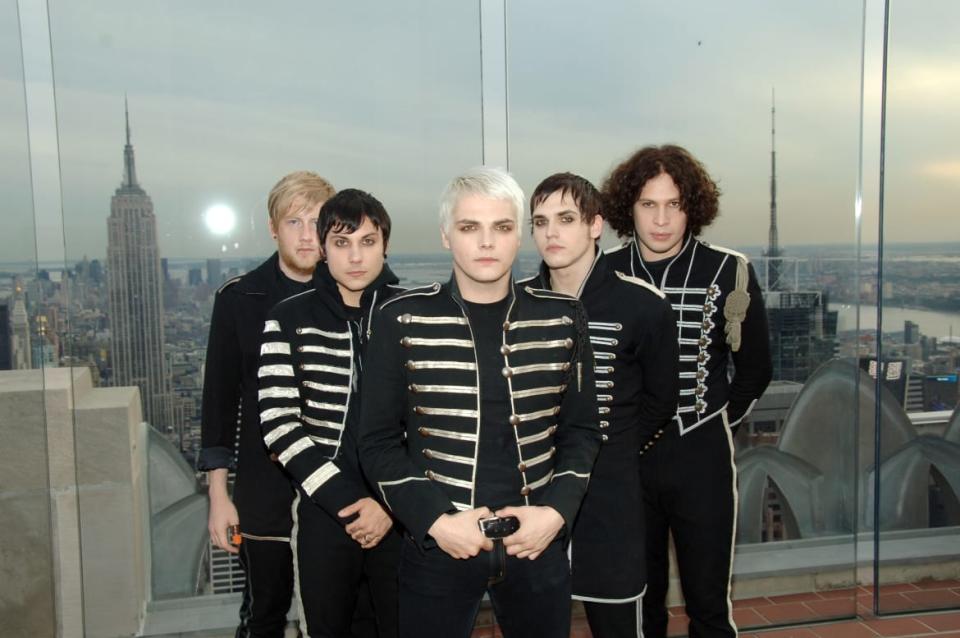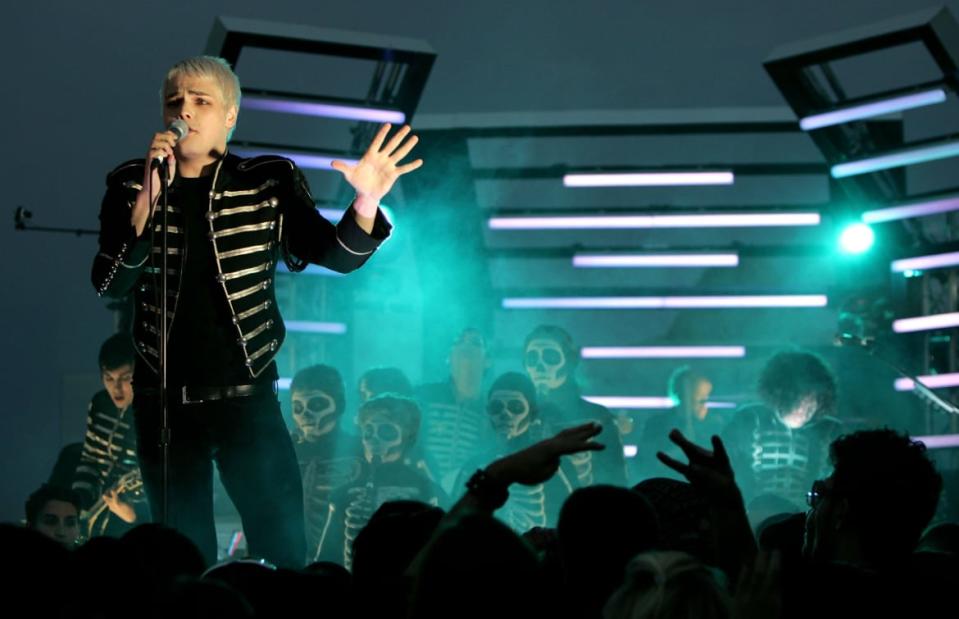How My Chemical Romance Crafted Their Classic Emo Anthem ‘Welcome to the Black Parade’

Steve Baltin’s upcoming book Anthems We Love (out Oct. 25 via HarperCollins), features the longtime music writer (and former Rolling Stone staffer) interviewing a wide array of music legends—from Carly Simon and The Beach Boys’ Brian Wilson to TLC’s Rozonda “Chilli” Thomas and U2’s The Edge—about the stories behind classic songs that have reached anthem status.
Most songs, no matter how big they become, have inauspicious live beginnings. Typically, the song was played first before it was released, as Grace Slick detailed with “White Rabbit,” to an audience totally unfamiliar with the track. Or on rare occasions, the song is a hit before it is played live, so the audience knows the song and sings along from the outset, as U2 experienced with “One.”
But no song in this collection had a more interesting debut live performance than My Chemical Romance’s 2006 anthem “Welcome to the Black Parade.”
“The first time we played that song was an extremely awkward experience. The first time we had ever played it, really, in a live sense was for the VMAs, and MTV was like, ‘Well, we have no room in the show proper, but you guys could play a song before the VMAs starts,’” My Chem frontman Gerard Way recalls. “And we had all agreed, ‘Okay, we’re gonna play ‘Welcome to the Black Parade.’’
We rehearsed it, obviously, but we hadn’t played it that much. We just played it however many times we had to practice before we did it. So you gotta picture this. We get to this building, it’s a real high-rise building, we go up there, all the gear is up there. Now, there’s this little very short kind of stage thing that I think they built, and they had taken the glass away from the edges, ‘cause they didn’t like the way it looked. So they had removed the barriers to keep you from falling off. Now, if you fell, you would have gotten seriously injured. You wouldn’t have hit the pavement because there was a landing, but the landing was really far away. And I started to develop a serious fear of heights. So we’re up here in this environment with all these people around, too, and we had said, ‘Maybe we can get some kids to sing with us.’ So we get some kids, who were very nice and very professional, and we put them in skeleton makeup.

So we have these kids. And we had not played this song as much as a band would like. We did our best in the time we had. But the song is kind of unconventional. It’s not like a lot of things you were hearing on the radio at the time. So I’m not sure it translated the first time we played it. We just kind of made our way through this thing. And I remember at the time, I think the sentiment on the song from the general public was just kind of like, ‘What was that? There are these kids in skeleton make-up, and we’re in all these uniforms, and I can’t really understand the song.’ And that was the vibe I got. People were like, ‘Oh, that was great.’ But I was like, ‘I don’t think this translated.’”
That very inauspicious debut was like a galaxy far, far away from thirteen years later, when the reunited band closed their triumphant first show in eight years with the song before thousands of screaming fans, singing every last word in unbridled ecstasy at L.A.’s Shrine Auditorium.
“We did know that we wanted to play ‘Black Parade’ last. We felt like this is the one to end with. This song will probably heighten the last of everyone’s energy, but all they have left for the end of the night, whatever is left from the whole show is gonna go into ‘Black Parade,’ because it did become this kind of anthem,” Way says. “And it does do something, once it really kicks in. I can kind of barely control myself once it kicks in, especially back in the day when I’d be so energized by what we were doing, I would fall over, convulse or whatever else. But something happens when that ring-out happens at the end of the introduction that has gotten very intense, and then there’s that moment of quiet, and then there’s just that drum fill and there’s something about that that energizes absolutely everybody in the room, including the band.”
So the question is, how did the song’s place in the world change so dramatically in the thirteen years from when it was released to the band’s first reunion show? Going back to the writing, Way says he knew the band was onto something special from the outset.
“Yes, we knew it was special. The song actually had started as this song called ‘The Five of Us Are Dying,’ which is like a riff on an old Twilight Zone episode title. It was these chords we really liked, it was a striving kind of a punk song. But as the concept of the record started to come together, we realized it was a special song, but I started to realize during the actual tracking of the album that there was no song that introduced or encapsulated some of the concepts on the record in that way,” he recalls. “There was definitely stuff that was capturing certain conceptual elements, like hell, and being raised Catholic, and mothers, and it had a lot of stuff, there’s like a war theme. But there was no ‘Black Parade’ song, and I had known that that’s what I wanted to call the album.”
As Way looks back on the recording of the song, it was not always a smooth process until the idea of the parade came into play. “It was actually a really hard song to record, because we were, in some ways, so used to the original version that when it came time to start changing things, it was just very difficult. And nobody knew if it was the right direction, and things like that,” he says. “But then I started to envision this parade, and so then I wanted to bring in certain elements. I would ask Bob, ‘Play a marching beat.’ But when it really started to come together is when I had this melody in my head, this piano melody, and I was like, ‘Rob, I think I have the way I want to start this song.’ So when the actual tracking happened is when it started to come together and really flesh out, as sections got added and things changed.”
The final pieces of the song eventually fell into place because of where they were recording, historic Eldorado studios in Burbank, where everyone from Alice In Chains, the Red Hot Chili Peppers and David Byrne to Herbie Hancock, Jewel and Jane’s Addiction have recorded.
“We were at Eldorado, which we liked. And there was a piano in this side room, so I went over there with Rob and he sat at the piano and I basically sung out all the notes, ‘cause I can’t really play piano. I could cheat my way through some stuff and I could write parts. I sit with keyboards actually a lot right now, and I can write parts, but at the time especially I just had very little experience with playing keys. So I sung it out and Rob just followed it, and then we had that, and then it started to come together,” Way says. “Then we put the vocal on. And so then we built this introduction for this song with a marching beat and a parade beat. And it really set the stage, I think, for the song to become something much greater than just, let’s say, a driving punk song. Since we were envisioning this kind of parade that comes for you, like death, the song just got more ambitious and grew and grew, and then just started throwing a ton of stuff on it. I know when Chris Lord-Alge mixed the song, at the time he had told us it was the most tracks he had ever had to mix in a song. I’m sure in the years later something beat that, but, at the time, it was the most tracks he had ever mixed.”
It probably didn’t hurt the song’s eventual place in history that it had one of the most popular songs ever, Queen’s “Bohemian Rhapsody,” as a huge inspiration for the complexity of “Black Parade.”
“‘Bohemian Rhapsody’ was always an influence on this song. Just these big sweeping section changes and things like that. But at the same time, I had realized when we were working on it, you can’t remake ‘Bohemian Rhapsody.’ You could be a little inspired by it, but we can’t try to do that,” Way says. “What I like to do sometimes in music is to be inspired by things from the past, but what you present people is something that has a really positive familiarity to it. Almost like something that gives you the feeling of something without having to be like it. And that was one of those songs that we realized, ‘Well, we’re not gonna copy ‘Bohemian Rhapsody.’ But we’re going to make this big epic thing like ‘Bohemian Rhapsody,’ in that way.’ I like a degree of familiarity. I like a degree of bringing people music that triggers something in them, like an old feeling from the past, without completely ripping the thing off. To me, these are little nods, and that’s why it almost becomes like putting Easter eggs in the song. These little nods to things, that when you put them in the song, you’re almost saying like, ‘We really like Queen.’ We’re really trying to honor stuff, and that’s why Queen, the Pumpkins, have been a big influence. I still explore Pumpkins stuff and explore those themes and sonic landscapes of theirs.”
While “Welcome to the Black Parade” was influenced by the likes of Queen and the Smashing Pumpkins, the song feels totally original and unique and speaks to the emo generation singularly because it is told through Way’s very personal and literary bent. It is his story.
“For me, a theme that I explore sometimes, and I definitely explored lyrically in ‘Black Parade’ was the triumph of the human spirit over darkness, over tragedy. Self-actualization has been a theme in a lot of the lyrics that I’ve written, kind of becoming what you’re supposed to become, evolving, changing, cocooning into your next form,” Way says. “And I just talked about this with Billy [Corgan] in that interview we did. I asked him if he thought that rock was a transformative thing, specifically rock. And he said, ‘Yes. I think it’s transformative.’ So the triumph of the human spirit over darkness was something that was kind of built into the DNA of the band from the beginning. The self-actualization, the triumph of the spirit and things like that, getting through really hard things.”

My Chemical Romance.
The song was impacted by Way’s very personal relationship with his grandmother, who he had written about previously. “Obviously, I lost my grandmother before we started writing ‘Revenge’ and that loss really impacted me, because she had been the person to sit with me and teach me how to draw or make me go to the piano with her. And she would play and she would make me sing along with her and stuff, so that we had a really amazing relationship,” he says. “So it was that loss and wanting to get over that loss and kind of triumph over that loss to kind of make her proud that drove me in songs like ‘Helena.’”
Going back to that Shrine show “Welcome to the Black Parade” is, as Way says, an obvious closer. It is one of the most powerful live songs of this century, an explosive, joyous anthem that lifts crowds from a thousand fans to 100,000 in a feverish sing-along.
Because of the complex nature of the song, it took a minute for the track to take its place as a live anthem. Way recalls it didn’t happen until partway through the tour for the album.
“Unless my memory is faulty, I don’t think we got to really play that live for people until the official Black Parade tour, unless I’m wrong. Because it was the first single, and because it kind of encapsulated the concept and themes of the record, and because of the lyric being kind of meaningful to us, we’d have to play it for mostly these taped performances. So we didn’t really get to get it in front of a live crowd for some time,” he says. “And then during the official kind of Black Parade tour in arenas, this thing started to happen, I noticed, when we would play it live, and it was almost like the whole audience started to kind of sing all those words, which can happen to a number of songs. But it started to feel like it had this power and that big kind of intense intro leading into just this full-on force wall of sound driving kind of punk thing generally just made all of us and the audience lose our minds and get a little bit out of control.”
Once the song eventually took its rightful place as a centerpiece of the live set, it became as immediately recognizable to fans as any live song out there, thanks to the piano.
“I’ve learned this in recent years, one of the most interesting things about the song is that it’s identifiable by one single note. That G note on the piano,” Way says. “And recently, I saw Andrew Lloyd Webber did a video where he discussed this. He was sitting at a piano, and I think he played a bit of Phantom of the Opera. He’s like, ‘It’s one thing to kind of know a song by its opening melody. And it’s another thing to be able to identify a song by one note.” He played the G note and everybody was like, ‘Oh, that’s ‘Black Parade.’’ That’s something pretty crazy about the song, is just hearing that single piano. And that’s something that we saw live when we would play it. We’d have to wait for it to kind of get quiet enough for people to hear it, ‘cause a lot of times the audience was competing with our actual sound. Like Mexico City, for example, I think the audience was louder than us. So we would have to let enough air, enough quiet happen, and then we’d just play that G note, and then it was crazy. Just that single note.”
That familiarity, triumph of the spirit and punk wall of sound Way and his band mates conveyed in the song made the deeply personal and uplifting track one of the most unlikely sports anthems of all time, at least for a short period, when the L.A. Kings hockey team adopted the song, a flattering choice, even for New Jersey Devils fans, as Way recalls.
“That was interesting. We were very flattered by that. They started to use ‘Black Parade’ and we had heard about it. That was kind of the first usage I really remember. And that was many years later, obviously, so yeah, the Kings, they’re doing this thing and we got put in an awkward situation because we’re all from Jersey,” he says laughing. “Our team is the Devils, and they were like, ‘Will you guys come and play ‘Black Parade’ for the Kings? This is like their song and they’re gonna win. This is a really big moment.’ And we were kind of like, ‘I don’t think we can.’ Because even though some of us live here now, we’re Jersey boys.”
Over the more than 15 years since the song has been part of the world it has had several honors, maybe none bigger or crazier for Way than The Rock and Roll Hall of Fame selecting the track as one of the 500 songs that shaped rock and roll.
It was listed right between Naughty by Nature’s “O.P.P.” and Mott The Hoople’s “All the Young Dudes.” “Dude, ‘All the Young Dudes’ that was a really big, influential song to me. There’s times for sure where I was trying to write things that had that energy,” Way says.
The same way he was moved by songs like “All the Young Dudes” and “Bohemian Rhapsody,” which he calls the “greatest rock song of all time for a number of reasons,” “Welcome to the Black Parade” has had that effect on others, like Ariana, a woman living in Argentina who was woken up by her mother with “Welcome to the Black Parade” every birthday.

Gerard Way of My Chemical Romance performs at the Top of the Rock in Rockefeller Plaza during the 2006 MTV Video Music Awards at Radio City Music Hall on Aug. 31, 2006, in New York City.
During the years My Chem was apart, Way was very consciously careful not to buy into the hype of the song, as he wanted to be away from social media and fanfare.
“So let’s talk about what happens when you release a song. Once you put something out, it is no longer yours, and it is no longer your story. For example, all I listened to for five months was Black Parade while we were making it. It was the music that excited me more than anything, it was the music that moved me more than anything else, it was what I was all about. And then we released it, and then at that point, with all the songs we had done, I let go of it, and I was just like, ‘It’s no longer ours. This is the world’s. And they’re going to do whatever they want with it,’” he says. “So I don’t listen any more to that stuff, and the only time I hear it is when we play it live. Of course, I’ve heard it on the radio and stuff, and Lindsey, my wife, is so sweet, and she gets so excited when she hears My Chemical Romance on the radio, especially ‘Black Parade.’ But yeah, so I don’t listen to these things anymore. Years ago, I had realized that I needed to disconnect from opinion, so I don’t read reviews, I don’t look at that stuff. I like to keep my channel as an output channel, not an input. And I think that really keeps the art pure.”
As much as Way stayed off social media and away from reviews, he was not isolated from the world as the band’s popularity grew exponentially during the several years they were broken up. He still heard from fans how the band’s music and that song, in particular, kept growing in popularity with fans.
ORDER STEVE BALTIN’S ‘ANTHEMS WE LOVE’
“In the universe of My Chemical Romance with My Chemical Romance’s fans and playing these tours and headlining these shows, it had started to become an anthem pretty quickly. But in terms of it becoming an anthem for the world or a larger audience or people outside that universe that did take some time,” Way says. “Even though I don’t kind of engage with social media, I don’t read reviews, I don’t read anything, I would hear the little stories about it, or I would meet somebody that would say, ‘Oh, ‘Black Parade’ is my song.’ And yeah, in the years the band broke up, I would hear little things and then I started to get this sense that, ‘This is kind of an anthem. It’s a big song to people.’ Yeah, that did take some time, but I would hear little stories.”
That the song has become the band’s signature anthem is particularly meaningful for Way because as he thinks back to writing it in L.A. all those years ago, he points out it is very much a song that combines all element and voices from My Chemical Romance.
“One little detail I just want to make sure is in there, is that despite bringing certain sections into it or altering things, or at least bringing the suggestion of altering things, that song, like a lot of My Chem stuff, was really this collaborative experience,” he says. “We’re just in this kind of haunted house together, kind of becoming slowly depressed and withdrawn and isolated from the world outside. I don’t remember us ever leaving this house, here at the Paramour. It became a dark place. And just being in there and kind of jamming this idea together and just kind of playing it together and getting the original bones of the song, that was really collaborative.”
When Way looks back now he sees, once again, that feeling of overcoming adversity in the song, which is so much of why it has become a modern-day anthem.
“There’s darkness in the world. And I think overcoming that darkness, that darkness externally and internally is a beautiful thing. It’s a challenging thing, but it is beautiful if you can do that, if you can kind of triumph over that. So that'’ a theme that’s definitely in ‘Black Parade.’”
Get the Daily Beast's biggest scoops and scandals delivered right to your inbox. Sign up now.
Stay informed and gain unlimited access to the Daily Beast's unmatched reporting. Subscribe now.

